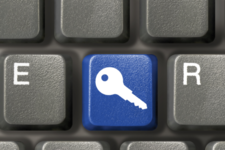Encrypt files in the shell with v02enc
Under Lock and Key

© Lead Image © Nikolai Sorokin, Fotolia.com
Sensitive data should never be stored in the clear, but encrypting data often requires dealing with the GnuPG juggernaut. v02enc takes the worries out of encryption with a simple process, shell-based access, and storage in Git directories.
When I took my first steps, it was frowned upon – and rightly so – to stay permanently logged into a system as root. To this day, the KDE graphical desktop environment displays a warning message if you so much as dare to log in as root. However, automation and orchestration were not an issue for many years, and many admins had no qualms about storing sensitive data such as passwords in plain text on disk.
It was not even standard practice to store system users' passwords in the encrypted /etc/shadow file. The "Linux Shadow Password HOWTO" guide [1] from March 1996 explained how to convert your system for the use of shadow passwords, but it took a while before shadow passwords finally became established on all Linux systems. When Debian GNU/Linux 3.0 (aka "woody") was released in 2002, it still prompted you to decide during the install whether you wanted to enable shadow passwords.
Today,storing passwords in plain text is considered an absolute no-no. Even services such as Postfix, which requires passwords to log in to an SMTP relay host can now store and read passwords in an encrypted form. Powerful tools are also available for popular automation tools such as Ansible or Puppet, making it easier to store passwords in an encrypted form and only access them at runtime. In terms of simple system security, you might think everything is looking good.
[...]
Buy this article as PDF
(incl. VAT)
Buy Linux Magazine
Subscribe to our Linux Newsletters
Find Linux and Open Source Jobs
Subscribe to our ADMIN Newsletters
Support Our Work
Linux Magazine content is made possible with support from readers like you. Please consider contributing when you’ve found an article to be beneficial.

News
-
The Next Linux Kernel Turns 7.0
Linus Torvalds has announced that after Linux kernel 6.19, we'll finally reach the 7.0 iteration stage.
-
Linux From Scratch Drops SysVinit Support
LFS will no longer support SysVinit.
-
LibreOffice 26.2 Now Available
With new features, improvements, and bug fixes, LibreOffice 26.2 delivers a modern, polished office suite without compromise.
-
Linux Kernel Project Releases Project Continuity Document
What happens to Linux when there's no Linus? It's a question many of us have asked over the years, and it seems it's also on the minds of the Linux kernel project.
-
Mecha Systems Introduces Linux Handheld
Mecha Systems has revealed its Mecha Comet, a new handheld computer powered by – you guessed it – Linux.
-
MX Linux 25.1 Features Dual Init System ISO
The latest release of MX Linux caters to lovers of two different init systems and even offers instructions on how to transition.
-
Photoshop on Linux?
A developer has patched Wine so that it'll run specific versions of Photoshop that depend on Adobe Creative Cloud.
-
Linux Mint 22.3 Now Available with New Tools
Linux Mint 22.3 has been released with a pair of new tools for system admins and some pretty cool new features.
-
New Linux Malware Targets Cloud-Based Linux Installations
VoidLink, a new Linux malware, should be of real concern because of its stealth and customization.
-
Say Goodbye to Middle-Mouse Paste
Both Gnome and Firefox have proposed getting rid of a long-time favorite Linux feature.
